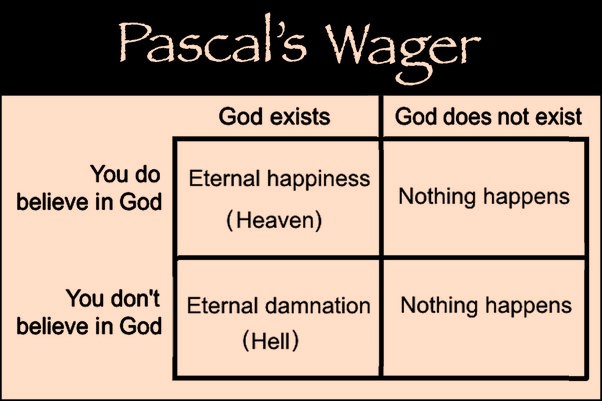Taking a Bet on God

Matt 18:3 (NIV ) - And He said, “Truly I tell you, unless you change and become like little children, you will never enter the kingdom of heaven.
Every time that Jesus begins a statement with something like "Truly, truly .. . . " or "I tell you the truth, . . . " it is a warning that what He is going say next will probably ruffle your feathers. It will probably be contrary to your established beliefs and mindset. And it may even be offensive to you! In this regard, Jesus repeatedly warned that there is something toxic about our prideful human intellect. The highly educated Pharisees and religious leaders missed their opportunity for salvation. But the tax collectors and prostitutes, the common people, and little children believed in Him.
Pascal (1623-1662) was a famous French mathematician and philosopher. Many medieval and rennaissance philosophers had attempted to prove (or disprove) the existence of God through logic and intellect. But none of these attempts worked because God saw to it that His existence could never be proven through human reasoning. This motivated Pascal to take a totally different approach which has fascinated Christians and non-Christians alike for nearly 400 years. His approach is widely known as "Pascal's Wager." But we moderns seem to have forgotten it. Pascal pointed out that, setting theology aside for the moment, there is a simple, pragmatic reason to believe that God exists. He reasoned as follows.
- On God's side there are only two alternatives: either He exists or He doesn't.
- And on the our side there are also only two alternatives: we either do or do not believe that He exists.
Just like flipping two coins, there are only 4 possible outcomes after you die. These can be summarized in a simple 2 by 2 "Truth Table" (displayed above). The columns pertain to the existence of God and the rows pertain to your belief about God. Consider the right hand column first. This column shows the 2 possble outcomes after you die if there is no God. They are both zeros because if there is no God, then there is no afterlife. So what you choose to believe about God is irrelevant after you die because you become a zero. You simply cease to exist. If you think that being a "bad dude" will bring you more pleasure during your short life on Earth, then go for it. Now consider the left column, which shows the 2 possible outcomes after you die if there is a God. One is infinitely good and the other is infinitely bad. Pascal did not advance his "wager" as a proof of God's existence but rather to point out that even if you are unsure about God, Choosing to believe in God is the only good outcome among the four possibilities.
Caveat: Although intriguing, Pascal's wager misses the Biblical fact that God wants you to do something more than merely taking a "bet" on Him, like taking a bet on a football game. And please don't take John 3:16 out of context and settle for "easy believism." That is dangerously close to taking a bet! The Devil and demons believe in God too - and shudder! (James 2:19). You need to repent and be born from above through the Holy Spirit, as Jesus explains to Nicodemus in John 3. Nevertheless, Pascal's wager can help someone see the big picture and get started down the right path. And that is huge!